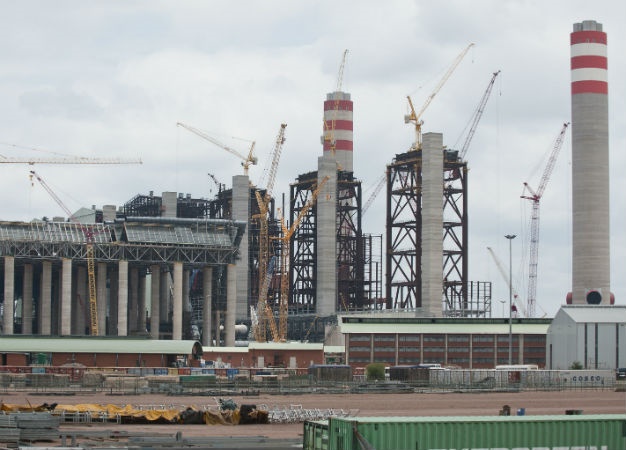
The transition from fossil fuels is inevitable. The question is how we can manage the transition in a manner that benefits us most, writes Mamphela Ramphele.
The dominant response of our society to the real and present catastrophic dangers of climate change is that "we cannot eat climate change". This response is tantamount to being content with continuing to eat our grandchildren's futures.
There is incontrovertible scientific evidence that the current level of consumption by humanity across the globe has gone beyond the boundaries of the planetary resources we are due. In 2015 we used resources equivalent to what can be produced by 1,6 planets. We are now borrowing, without permission, from resources due to those yet to be born.
Evidence of catastrophic changes in the weather patterns in our country and across the globe can no longer be ignored as anomalies. Scientific evidence and lived reality of extreme weather patterns cannot be wished away.
READ: Part of the answer to climate change may be South Africa's wetlands
Extreme heat, droughts and floods as reported in the Karoo, are symptoms of the impact of human actions on the environment and the ecosystem that pose a real and present danger to life as we know it today. Capetonians and others across the country have experienced the pain of water shedding. More is to come.
The South African Academy of Sciences that promotes science knowledge to enhance the well being of society, in its November 2018 issue of QUEST is sounding the alarm bells. It has set out an urgent to-do list for southern Africa to meet its obligations to the Intergovernmental Agreement on Climate Change our government signed in 2015 in Paris.
The frightening reality is that no country in the world is on track to meet the obligations to keep global warming below 1.5 Celsius by halving our carbon footprint by 2030 and getting it to zero by 2050.
Africa as a continent is the most vulnerable region to the risks of climate change given the impact of the legacy and on-going extractive economic development models introduced by colonial conquest, inequitable spatial planning that make for a high carbon footprint due to inefficient sprawling cities with pollutant transport systems accompanied by very poor levels of public services.
We know from Green Peace research reports that Mpumalanga is the most polluted region in the world with carbon dioxide, sulphur and nitrogen emissions from the combination of Eskom and Sasol energy generation and oil production. The cruel irony is that archaeological evidence attests to Mpumalanga having been the food basket of our region in ancient history.
The coal we are now mining and laying bare resulting in high carbon emissions, was the organic fertiliser that ensured food security and trading between nations of the surplus produced. Yes, people did eat healthily because they respected nature!
The ANC government has failed to lead a sustainable transition from high carbon footprint electricity generation to renewable energy. After initiating a laudable world class Renewable Energy Independent Producer Program (IPP) in the early 2000s, the government unilaterally suspended it under pressure from Eskom and the labour unions. The IPP has been re-launched under President Cyril Ramaphosa's leadership, after many missed opportunities to wean ourselves from coal fired electricity.
The transition from fossil fuels is inevitable. The question is how we can manage the transition in a manner that benefits us most. The government needs to overcome its conflict of interest dilemmas arising out of its alliance with the labour unions under Cosatu. South African citizens deserve better. Those yet to be born deserve better.
The reality is that the Kusile and Medupi power stations remain incomplete with huge cost overruns estimated in 2016 to be about R420bn due to impunity of corruption at Eskom.
ALSO READ: Clem Sunter - A tale of two centuries: How different they are
These power stations are destined to become stranded assets post 2030. Our traditional trade partners will not trade with us for fear of us undermining their own efforts to lower their carbon footprints to zero by 2050 as agreed in the 2015 Paris Accord.
The good news is that you can eat climate change! Here is why. The transitions we need to make to urgently tackle climate change are very good for the wellbeing of humans and nature. First, preserving nature ensures sustainability of species that sustain our lives and are essential to livelihoods and industries of tourism and food security. We would also be healthier and spend less money on respiratory and other diseases, including cancer.
Second, we can create more jobs in a more sustainable way from renewable energy sources from our abundant sunshine, wind and rivers in Africa and connect every home with safe clean energy without the dangers of informal connections that are killing our children.
Third, we urgently need to build compact cities and towns to create safe, clean and dignified human settlements that would create millions of sustainable and decent jobs. The benefits of compact cities and towns include higher quality public services and more cohesive communities across the fault lines of our society. People living together, children playing and schooling together would inevitably work together for the common good.
The rest of the world is looking to Ubuntu as a vehicle and defining value system to enable humanity living in harmony with one another and with nature. Humanity evolved here because our ancestors learnt to live in harmony with nature. We urgently need to tap into that rich heritage to sustain us and those yet to be born.
- Mamphela Ramphele is co-founder of ReimagineSA.
Disclaimer: News24 encourages freedom of speech and the expression of diverse views. The views of columnists published on News24 are therefore their own and do not necessarily represent the views of News24.




 Publications
Publications
 Partners
Partners

























